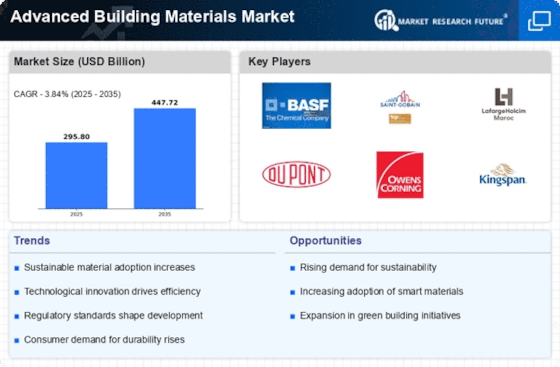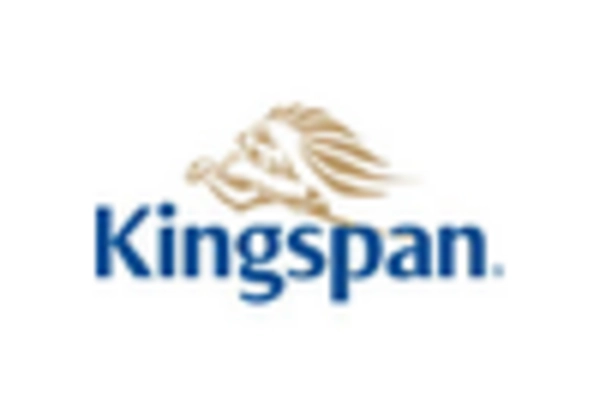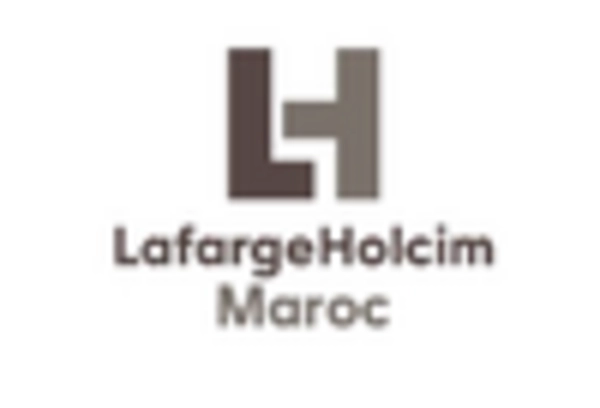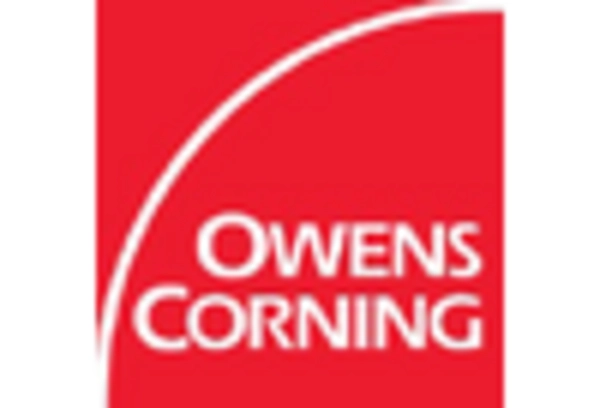Concrete
Glass
Insulation
Metals
Wood
Structural
Thermal
Acoustic
Waterproofing
Fire-Resistant
Residential
Commercial
Industrial
Infrastructure
Roofing
Flooring
Walls
Facades
Doors and Windows
North America
Europe
South America
Asia Pacific
Middle East and Africa
North America Outlook (USD Billion, 2019-2032)
Advanced Building Materials Market by Material Type
Concrete
Glass
Insulation
Metals
Wood
Advanced Building Materials Market by Functionality Type
Structural
Thermal
Acoustic
Waterproofing
Fire-Resistant
Advanced Building Materials Market by End Use Type
Residential
Commercial
Industrial
Infrastructure
Advanced Building Materials Market by Application Type
Roofing
Flooring
Walls
Facades
Doors and Windows
Advanced Building Materials Market by Regional Type
US
Canada
US Outlook (USD Billion, 2019-2032)
Advanced Building Materials Market by Material Type
Concrete
Glass
Insulation
Metals
Wood
Advanced Building Materials Market by Functionality Type
Structural
Thermal
Acoustic
Waterproofing
Fire-Resistant
Advanced Building Materials Market by End Use Type
Residential
Commercial
Industrial
Infrastructure
Advanced Building Materials Market by Application Type
Roofing
Flooring
Walls
Facades
Doors and Windows
CANADA Outlook (USD Billion, 2019-2032)
Advanced Building Materials Market by Material Type
Concrete
Glass
Insulation
Metals
Wood
Advanced Building Materials Market by Functionality Type
Structural
Thermal
Acoustic
Waterproofing
Fire-Resistant
Advanced Building Materials Market by End Use Type
Residential
Commercial
Industrial
Infrastructure
Advanced Building Materials Market by Application Type
Roofing
Flooring
Walls
Facades
Doors and Windows
Europe Outlook (USD Billion, 2019-2032)
Advanced Building Materials Market by Material Type
Concrete
Glass
Insulation
Metals
Wood
Advanced Building Materials Market by Functionality Type
Structural
Thermal
Acoustic
Waterproofing
Fire-Resistant
Advanced Building Materials Market by End Use Type
Residential
Commercial
Industrial
Infrastructure
Advanced Building Materials Market by Application Type
Roofing
Flooring
Walls
Facades
Doors and Windows
Advanced Building Materials Market by Regional Type
Germany
UK
France
Russia
Italy
Spain
Rest of Europe
GERMANY Outlook (USD Billion, 2019-2032)
Advanced Building Materials Market by Material Type
Concrete
Glass
Insulation
Metals
Wood
Advanced Building Materials Market by Functionality Type
Structural
Thermal
Acoustic
Waterproofing
Fire-Resistant
Advanced Building Materials Market by End Use Type
Residential
Commercial
Industrial
Infrastructure
Advanced Building Materials Market by Application Type
Roofing
Flooring
Walls
Facades
Doors and Windows
UK Outlook (USD Billion, 2019-2032)
Advanced Building Materials Market by Material Type
Concrete
Glass
Insulation
Metals
Wood
Advanced Building Materials Market by Functionality Type
Structural
Thermal
Acoustic
Waterproofing
Fire-Resistant
Advanced Building Materials Market by End Use Type
Residential
Commercial
Industrial
Infrastructure
Advanced Building Materials Market by Application Type
Roofing
Flooring
Walls
Facades
Doors and Windows
FRANCE Outlook (USD Billion, 2019-2032)
Advanced Building Materials Market by Material Type
Concrete
Glass
Insulation
Metals
Wood
Advanced Building Materials Market by Functionality Type
Structural
Thermal
Acoustic
Waterproofing
Fire-Resistant
Advanced Building Materials Market by End Use Type
Residential
Commercial
Industrial
Infrastructure
Advanced Building Materials Market by Application Type
Roofing
Flooring
Walls
Facades
Doors and Windows
RUSSIA Outlook (USD Billion, 2019-2032)
Advanced Building Materials Market by Material Type
Concrete
Glass
Insulation
Metals
Wood
Advanced Building Materials Market by Functionality Type
Structural
Thermal
Acoustic
Waterproofing
Fire-Resistant
Advanced Building Materials Market by End Use Type
Residential
Commercial
Industrial
Infrastructure
Advanced Building Materials Market by Application Type
Roofing
Flooring
Walls
Facades
Doors and Windows
ITALY Outlook (USD Billion, 2019-2032)
Advanced Building Materials Market by Material Type
Concrete
Glass
Insulation
Metals
Wood
Advanced Building Materials Market by Functionality Type
Structural
Thermal
Acoustic
Waterproofing
Fire-Resistant
Advanced Building Materials Market by End Use Type
Residential
Commercial
Industrial
Infrastructure
Advanced Building Materials Market by Application Type
Roofing
Flooring
Walls
Facades
Doors and Windows
SPAIN Outlook (USD Billion, 2019-2032)
Advanced Building Materials Market by Material Type
Concrete
Glass
Insulation
Metals
Wood
Advanced Building Materials Market by Functionality Type
Structural
Thermal
Acoustic
Waterproofing
Fire-Resistant
Advanced Building Materials Market by End Use Type
Residential
Commercial
Industrial
Infrastructure
Advanced Building Materials Market by Application Type
Roofing
Flooring
Walls
Facades
Doors and Windows
REST OF EUROPE Outlook (USD Billion, 2019-2032)
Advanced Building Materials Market by Material Type
Concrete
Glass
Insulation
Metals
Wood
Advanced Building Materials Market by Functionality Type
Structural
Thermal
Acoustic
Waterproofing
Fire-Resistant
Advanced Building Materials Market by End Use Type
Residential
Commercial
Industrial
Infrastructure
Advanced Building Materials Market by Application Type
Roofing
Flooring
Walls
Facades
Doors and Windows
APAC Outlook (USD Billion, 2019-2032)
Advanced Building Materials Market by Material Type
Concrete
Glass
Insulation
Metals
Wood
Advanced Building Materials Market by Functionality Type
Structural
Thermal
Acoustic
Waterproofing
Fire-Resistant
Advanced Building Materials Market by End Use Type
Residential
Commercial
Industrial
Infrastructure
Advanced Building Materials Market by Application Type
Roofing
Flooring
Walls
Facades
Doors and Windows
Advanced Building Materials Market by Regional Type
China
India
Japan
South Korea
Malaysia
Thailand
Indonesia
Rest of APAC
CHINA Outlook (USD Billion, 2019-2032)
Advanced Building Materials Market by Material Type
Concrete
Glass
Insulation
Metals
Wood
Advanced Building Materials Market by Functionality Type
Structural
Thermal
Acoustic
Waterproofing
Fire-Resistant
Advanced Building Materials Market by End Use Type
Residential
Commercial
Industrial
Infrastructure
Advanced Building Materials Market by Application Type
Roofing
Flooring
Walls
Facades
Doors and Windows
INDIA Outlook (USD Billion, 2019-2032)
Advanced Building Materials Market by Material Type
Concrete
Glass
Insulation
Metals
Wood
Advanced Building Materials Market by Functionality Type
Structural
Thermal
Acoustic
Waterproofing
Fire-Resistant
Advanced Building Materials Market by End Use Type
Residential
Commercial
Industrial
Infrastructure
Advanced Building Materials Market by Application Type
Roofing
Flooring
Walls
Facades
Doors and Windows
JAPAN Outlook (USD Billion, 2019-2032)
Advanced Building Materials Market by Material Type
Concrete
Glass
Insulation
Metals
Wood
Advanced Building Materials Market by Functionality Type
Structural
Thermal
Acoustic
Waterproofing
Fire-Resistant
Advanced Building Materials Market by End Use Type
Residential
Commercial
Industrial
Infrastructure
Advanced Building Materials Market by Application Type
Roofing
Flooring
Walls
Facades
Doors and Windows
SOUTH KOREA Outlook (USD Billion, 2019-2032)
Advanced Building Materials Market by Material Type
Concrete
Glass
Insulation
Metals
Wood
Advanced Building Materials Market by Functionality Type
Structural
Thermal
Acoustic
Waterproofing
Fire-Resistant
Advanced Building Materials Market by End Use Type
Residential
Commercial
Industrial
Infrastructure
Advanced Building Materials Market by Application Type
Roofing
Flooring
Walls
Facades
Doors and Windows
MALAYSIA Outlook (USD Billion, 2019-2032)
Advanced Building Materials Market by Material Type
Concrete
Glass
Insulation
Metals
Wood
Advanced Building Materials Market by Functionality Type
Structural
Thermal
Acoustic
Waterproofing
Fire-Resistant
Advanced Building Materials Market by End Use Type
Residential
Commercial
Industrial
Infrastructure
Advanced Building Materials Market by Application Type
Roofing
Flooring
Walls
Facades
Doors and Windows
THAILAND Outlook (USD Billion, 2019-2032)
Advanced Building Materials Market by Material Type
Concrete
Glass
Insulation
Metals
Wood
Advanced Building Materials Market by Functionality Type
Structural
Thermal
Acoustic
Waterproofing
Fire-Resistant
Advanced Building Materials Market by End Use Type
Residential
Commercial
Industrial
Infrastructure
Advanced Building Materials Market by Application Type
Roofing
Flooring
Walls
Facades
Doors and Windows
INDONESIA Outlook (USD Billion, 2019-2032)
Advanced Building Materials Market by Material Type
Concrete
Glass
Insulation
Metals
Wood
Advanced Building Materials Market by Functionality Type
Structural
Thermal
Acoustic
Waterproofing
Fire-Resistant
Advanced Building Materials Market by End Use Type
Residential
Commercial
Industrial
Infrastructure
Advanced Building Materials Market by Application Type
Roofing
Flooring
Walls
Facades
Doors and Windows
REST OF APAC Outlook (USD Billion, 2019-2032)
Advanced Building Materials Market by Material Type
Concrete
Glass
Insulation
Metals
Wood
Advanced Building Materials Market by Functionality Type
Structural
Thermal
Acoustic
Waterproofing
Fire-Resistant
Advanced Building Materials Market by End Use Type
Residential
Commercial
Industrial
Infrastructure
Advanced Building Materials Market by Application Type
Roofing
Flooring
Walls
Facades
Doors and Windows
South America Outlook (USD Billion, 2019-2032)
Advanced Building Materials Market by Material Type
Concrete
Glass
Insulation
Metals
Wood
Advanced Building Materials Market by Functionality Type
Structural
Thermal
Acoustic
Waterproofing
Fire-Resistant
Advanced Building Materials Market by End Use Type
Residential
Commercial
Industrial
Infrastructure
Advanced Building Materials Market by Application Type
Roofing
Flooring
Walls
Facades
Doors and Windows
Advanced Building Materials Market by Regional Type
Brazil
Mexico
Argentina
Rest of South America
BRAZIL Outlook (USD Billion, 2019-2032)
Advanced Building Materials Market by Material Type
Concrete
Glass
Insulation
Metals
Wood
Advanced Building Materials Market by Functionality Type
Structural
Thermal
Acoustic
Waterproofing
Fire-Resistant
Advanced Building Materials Market by End Use Type
Residential
Commercial
Industrial
Infrastructure
Advanced Building Materials Market by Application Type
Roofing
Flooring
Walls
Facades
Doors and Windows
MEXICO Outlook (USD Billion, 2019-2032)
Advanced Building Materials Market by Material Type
Concrete
Glass
Insulation
Metals
Wood
Advanced Building Materials Market by Functionality Type
Structural
Thermal
Acoustic
Waterproofing
Fire-Resistant
Advanced Building Materials Market by End Use Type
Residential
Commercial
Industrial
Infrastructure
Advanced Building Materials Market by Application Type
Roofing
Flooring
Walls
Facades
Doors and Windows
ARGENTINA Outlook (USD Billion, 2019-2032)
Advanced Building Materials Market by Material Type
Concrete
Glass
Insulation
Metals
Wood
Advanced Building Materials Market by Functionality Type
Structural
Thermal
Acoustic
Waterproofing
Fire-Resistant
Advanced Building Materials Market by End Use Type
Residential
Commercial
Industrial
Infrastructure
Advanced Building Materials Market by Application Type
Roofing
Flooring
Walls
Facades
Doors and Windows
REST OF SOUTH AMERICA Outlook (USD Billion, 2019-2032)
Advanced Building Materials Market by Material Type
Concrete
Glass
Insulation
Metals
Wood
Advanced Building Materials Market by Functionality Type
Structural
Thermal
Acoustic
Waterproofing
Fire-Resistant
Advanced Building Materials Market by End Use Type
Residential
Commercial
Industrial
Infrastructure
Advanced Building Materials Market by Application Type
Roofing
Flooring
Walls
Facades
Doors and Windows
MEA Outlook (USD Billion, 2019-2032)
Advanced Building Materials Market by Material Type
Concrete
Glass
Insulation
Metals
Wood
Advanced Building Materials Market by Functionality Type
Structural
Thermal
Acoustic
Waterproofing
Fire-Resistant
Advanced Building Materials Market by End Use Type
Residential
Commercial
Industrial
Infrastructure
Advanced Building Materials Market by Application Type
Roofing
Flooring
Walls
Facades
Doors and Windows
Advanced Building Materials Market by Regional Type
GCC Countries
South Africa
Rest of MEA
GCC COUNTRIES Outlook (USD Billion, 2019-2032)
Advanced Building Materials Market by Material Type
Concrete
Glass
Insulation
Metals
Wood
Advanced Building Materials Market by Functionality Type
Structural
Thermal
Acoustic
Waterproofing
Fire-Resistant
Advanced Building Materials Market by End Use Type
Residential
Commercial
Industrial
Infrastructure
Advanced Building Materials Market by Application Type
Roofing
Flooring
Walls
Facades
Doors and Windows
SOUTH AFRICA Outlook (USD Billion, 2019-2032)
Advanced Building Materials Market by Material Type
Concrete
Glass
Insulation
Metals
Wood
Advanced Building Materials Market by Functionality Type
Structural
Thermal
Acoustic
Waterproofing
Fire-Resistant
Advanced Building Materials Market by End Use Type
Residential
Commercial
Industrial
Infrastructure
Advanced Building Materials Market by Application Type
Roofing
Flooring
Walls
Facades
Doors and Windows
REST OF MEA Outlook (USD Billion, 2019-2032)
Advanced Building Materials Market by Material Type
Concrete
Glass
Insulation
Metals
Wood
Advanced Building Materials Market by Functionality Type
Structural
Thermal
Acoustic
Waterproofing
Fire-Resistant
Advanced Building Materials Market by End Use Type
Residential
Commercial
Industrial
Infrastructure
Advanced Building Materials Market by Application Type
Roofing
Flooring
Walls
Facades
Doors and Windows



















Leave a Comment